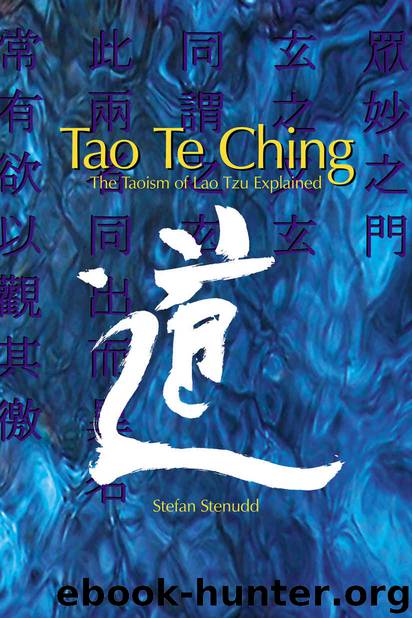Tao Te Ching: The Taoism of Lao Tzu Explained by Stenudd Stefan & Tzu Lao

Author:Stenudd, Stefan & Tzu, Lao [Stenudd, Stefan]
Language: eng
Format: epub
Publisher: Arriba
Published: 2011-02-06T16:00:00+00:00
Hsiang, image, also meaning elephant.
36
What should be shrunken must first be stretched.
What should be weakened must first be strengthened.
What should be abolished must first be cherished.
What should be deprived must first be enriched.
This is called understanding the hidden.
The soft and weak overcome the hard and strong.
The fish cannot leave the deep waters.
The state’s weaponry should not be displayed.
One Postulates the Other
Ancient Chinese thought is often done in polarities, like yin and yang. They are not alone in that. In many traditions around the world, existence is seen as the dynamics between two opposites. They may be light and dark, high and low, hot and cold, life and death, good and bad, and so on. Lao Tzu is also fond of it, although he sees a single unity, Tao, at the very root of it all.
In this chapter he mentions examples of opposite directions or actions, instead of opposite fixed states. Stretching is one direction, shrinking is its opposite. What he claims about their relation implies mutual dependence, comparable to what happens in our breathing. We must inhale before we can exhale, and exhale before we can inhale. There is no ideal middle point, between exhalation and inhalation. If we remain there we suffocate.
The opposites are interacting continuously. It’s never just one or the other, not even a resting place between them. Things shrink or expand, they are weakened or strengthened, but never completely still. People are cherished or abolished, enriched or deprived, but never stay for long in one solid state of affairs. The whole universe is all about movement and change.
Not even in death is stillness achieved. What dies will start to decay and decompose, later to reappear as material in a new creature. We may die, but we don’t stop moving. That’s the kind of immortality we know for certain. Nothing ever halts.
Considering this, we can look at the processes Lao Tzu mentions, and other similar examples, with different eyes. If we are to accept how Tao makes the world progress, we should not seek for balance between opposites. We should adapt to the revolving changes, since they are unavoidable. Whatever stops changing ceases to exist, if that’s at all possible.
When we are cherished we should be aware that the opposite is near at hand. The more you are praised above others, the higher the risk that they get tired of it and turn their backs to you.
People even allow themselves to do that for puny reasons, because they have praised the person previously, as if that is an excuse. The less you are elevated, the less your fall will be.
There will be moments when we are elevated, be it minutely, and moments when we fall from that height. We should avoid getting carried away by the former or getting desperate when the latter occurs. We can’t expect to escape it completely in life.
The same goes for being enriched and deprived. The more we get, the more we risk losing. Certainly, nobody goes through life without ever getting or losing something, so again we just have to treat these occurrences with the appropriate calm.
Download
This site does not store any files on its server. We only index and link to content provided by other sites. Please contact the content providers to delete copyright contents if any and email us, we'll remove relevant links or contents immediately.
| Confucianism | Feng Shui |
| I Ching | Jainism |
| Karma | Shintoism |
| Sikhism | Tao Te Ching |
| Taoism | Tibetan Book of the Dead |
| Zoroastrianism |
The Tao of Physics by Fritjof Capra(2272)
Human Design by Chetan Parkyn(2068)
The Diamond Cutter by Geshe Michael Roach(2058)
Feng Shui by Stephen Skinner(1937)
The Alchemy of Sexual Energy by Mantak Chia(1855)
Tao Te Ching by Lao Tzu(1834)
365 Tao: Daily Meditations by Ming-Dao Deng(1616)
Tao Tantric Arts for Women by Minke de Vos(1592)
Sun Tzu's The Art of War by Giles Lionel Minford John Tzu Sun(1531)
Sidney Sheldon (1982) Master Of The Game by Sidney Sheldon(1512)
Buddhism 101 by Arnie Kozak(1508)
Karma-Yoga and Bhakti-Yoga by Swami Vivekananda(1488)
The Analects of Confucius by Burton Watson(1429)
The Art of War Other Classics of Eastern Philosophy by Sun Tzu Lao-Tzu Confucius Mencius(1412)
The Way of Chuang Tzu by Thomas Merton(1361)
Tao te ching by Lao Tzu(1356)
The New Bohemians Handbook by Justina Blakeney(1350)
The Sayings Of by Confucius(1312)
Bless This House by Donna Henes(1267)
